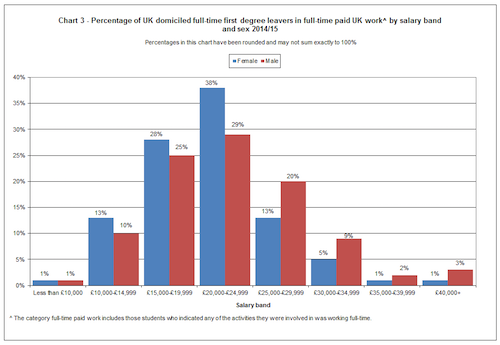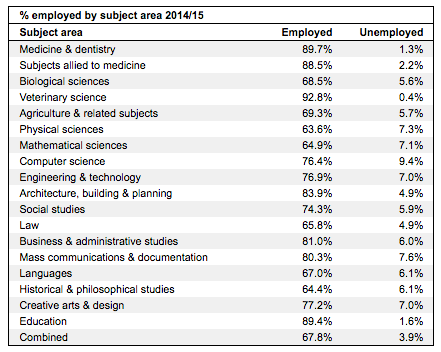Report shows 23% of new graduates are working ‘non-professional’ jobs
A new government-funded report suggests a number of graduates are moving into ‘non-professional’ jobs to avoid unemployment after graduation.
 Credit: Matthew Hurst – Flickr
Credit: Matthew Hurst – Flickr
Despite recent figures indicating that UK graduate employment rates are currently at a record high, a new report has just been released claiming that 23% of new graduates are moving on to work in jobs that they’re overqualified for.
The report, released by the Higher Education Statistics Agency (HESA) suggests that although graduate unemployment rates are as low as 5.2%, many uni leavers are taking on ‘non-professional’ jobs in order to protect themselves from unemployment.
Important takeaways from the report

Gender pay gap is widening in graduate jobs
The data collected regarding earnings of uni leavers showed that not only are women earning less in jobs when they leave uni, but the pay gap is actually getting wider.
The data showed that female graduates are starting out on an average salary of £21,000 whilst male graduate salaries are averaging at £24,000. This is an increase of £1,000 on the report from the previous year, suggesting that gender inequality is still rife in the world of graduate employment.

Credit: HESA
High unemployment in Computer Sciences
The degree subjects with the highest levels of unemployment were Computer Science (9.2%), Mass communication and Documentation (aka Media Studies, Journalism and Publishing - 7.6%) and Physical Sciences (7.3%).
In contrast, the degree subjects with the highest employment rates were Veterinary Science (92.8%), Education (89.4%) and Medicine & Dentistry (89.7%).

Credit: HESA
5.6% are taking up self-employment
Interestingly, the survey found that as much as 5% of uni leavers were moving into self-employment or taking on freelance work in their specialist area.
Not only this, but 0.6% (that’s almost 2000 of the young people surveyed) were in the process of starting their own business!
Our problem with the report
 Our slight issue with the report is that breaking all job positions down into either ‘professional’ or ‘non-professional’ categories in a 2016 job market isn't so straight forward.
Our slight issue with the report is that breaking all job positions down into either ‘professional’ or ‘non-professional’ categories in a 2016 job market isn't so straight forward.
The distinction between professional and non-professional jobs is known to be fuzzy, as traditionally it comes down to those jobs that require ‘mental work’ or specific educational training as opposed to jobs that require little mental labour or don’t require a degree.
However, many would argue that today’s job market is a bit too complex for these kinds of distinctions. For example, HESA’s report considers administrative, secretarial and clerk jobs as ‘non-professional’, despite the fact that a university degree is often required to land a job in these fields.
Also, the data is based on what students were doing just six months after graduation, which is a relatively short time to base the report on.
Many graduates could be a period of transition, or working in an unrelated field temporarily whilst waiting for a grad scheme to begin if they missed the January deadlines.
Therefore, we’d be tempted to think that the results could look quite different if graduates were asked the same questions a year after graduation as opposed to just six months.
Finished up at uni and entering the world of graduate employment? We've got a whole load of graduate advice that will help you take your next steps.
Any questions? Give us a shout!








